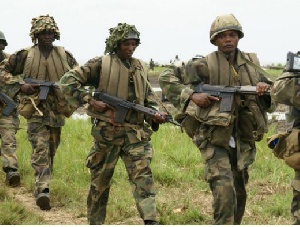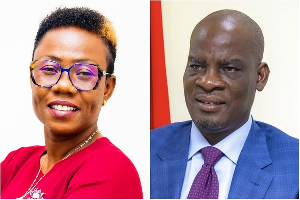Cape Coast, Aug. 28, GNA - The Anglican Bishop of Koforidua, Right Reverend Francis Quashie, on Saturday, exhorted both the clergy and laity of the Anglican Church to desist from dissipating their energies and resources in activities that impinge on the growth and development of the church.
He expressed concern about the church being saddled today with ignorance and indiscipline, and that indiscipline was "eating too much into the very fabric of the church" to the extent that, issues that ought to be settled within a short time, were being unnecessarily prolonged.
Rt. Rev. Quashie, expressed these sentiments, when he opened the '4th Biennial National Delegates Conference of the Anglican Men's Fellowship, under the theme, "Empowering the Lay Apostolate in Contemporary Anglicanism", in Cape Coast.
"It is becoming very embarrassing to us as a church. It is sad that there is always the likelihood that some lay people connive and condone with a priest to hold the whole church to ransom", and cautioned that "the earlier this comes to an end, the better it will be for us all". The Bishop pointed out that this was imperative, because the church had a ministry to execute, and that to bring salvation to the human spirit was the goal of its ministry.
Touching on the theme for the conference, he said the laity had to be effectively empowered to contribute constructively to the activities of the church, and also expressed concern that although liturgy was congregational and participatory, there was currently, "a worrying situation", in the church whereby, the majority of the laity "have become more or less spectators, expecting the priests to do everything".
He emphasized that there could be no effective worship without lay participation, and that the church's liturgy should be "contextualised and in cultured", by having it reviewed and translated into local languages, such as Ewe, Ga-Dangbe, Twi and Hausa, to facilitate the participation of the entire congregation.
He said to enhance the participation of the laity, a 'Diocesan Education Centre' set up in his diocese had so far trained 30 lay members as evangelists and catechists, but said a similar centre set up in Kumasi by the Joint Anglican Diocesan Council (JADC), was not being well patronized.
He stressed the need for professionals, as well as the talented among the laity, to also be encouraged to bring their expertise to bear on the operations of the church.
Rt. Rev. Quashie observed that such actions were necessary because the lay apostolate formed the majority of the church's membership and were "very valuable" members, and that their empowerment was crucial to the growth of the church.
He tasked the lay apostolate to be prayerful and to diligently study and apply the scriptures to their daily lives and endeavour to have a good sense of stewardship, instead of complaining and criticizing the church and the priests.
"You must support the church with your God given resources. Your time, money, talents and skills", he admonished them.
In his address, His Eminence Peter Cardinal Appiah Turkson, Archbishop of Cape Coast, observed that the laity and clergy operated within temporal and spiritual domains and there was the need for them to complement each other to ensure that the vision of the church was defined without confusion.
He pointed out that the first source of empowerment comes from God, stressing that "there is no alternative to this source" and what was needed was for Christians to adopt the "technique" of assessing this power, by being prayerful.
According to the Cardinal, any form of ministry within the church had to be from God, and that "there was no other way of saving God's people", and explained that congregations "do not belong to priests, but to God".
He asked members of the fellowship to support and ensure that God led the church in all its endeavours.
The national president of the fellowship, Mr Josephus Brown, said the conference was to enable members take stock of their activities within the past two years and evolve measures for forging ahead, and that they had to constantly examine their objectives to meet the challenges and changes in the world.
Messages from the church's bishops of Accra, Tamale and Kumasi, also depicted the need for members of the fellowship to support the growth of both the church and society.
A new national executive is to be elected as part of activities of the three-day conference.
General News of Monday, 28 August 2006
Source: GNA
Bishop unhappy about situation in Anglican Church
Entertainment











